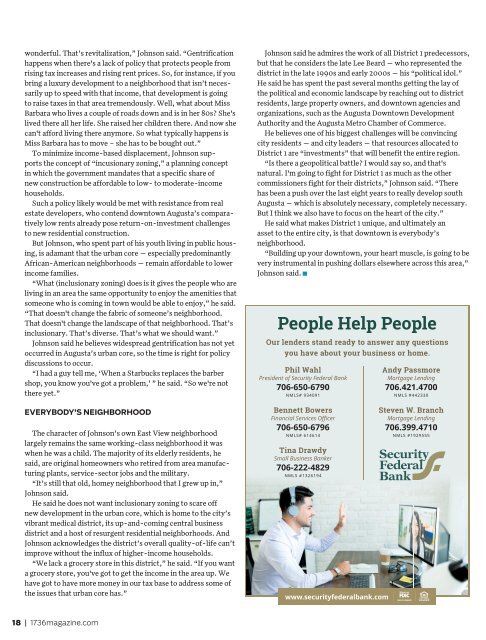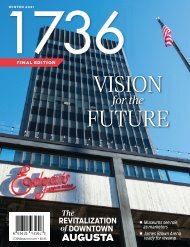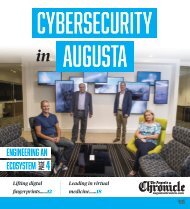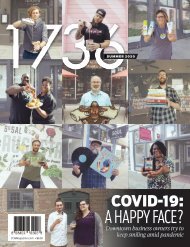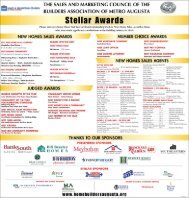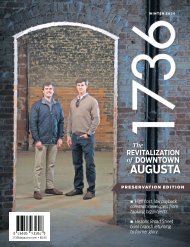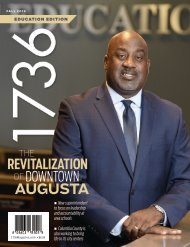Fall 2020 - 1736 Magazine
You also want an ePaper? Increase the reach of your titles
YUMPU automatically turns print PDFs into web optimized ePapers that Google loves.
wonderful. That’s revitalization,” Johnson said. “Gentrification<br />
happens when there's a lack of policy that protects people from<br />
rising tax increases and rising rent prices. So, for instance, if you<br />
bring a luxury development to a neighborhood that isn’t necessarily<br />
up to speed with that income, that development is going<br />
to raise taxes in that area tremendously. Well, what about Miss<br />
Barbara who lives a couple of roads down and is in her 80s? She's<br />
lived there all her life. She raised her children there. And now she<br />
can't afford living there anymore. So what typically happens is<br />
Miss Barbara has to move – she has to be bought out.”<br />
To minimize income-based displacement, Johnson supports<br />
the concept of “incusionary zoning,” a planning concept<br />
in which the government mandates that a specific share of<br />
new construction be affordable to low- to moderate-income<br />
households.<br />
Such a policy likely would be met with resistance from real<br />
estate developers, who contend downtown Augusta’s comparatively<br />
low rents already pose return-on-investment challenges<br />
to new residential construction.<br />
But Johnson, who spent part of his youth living in public housing,<br />
is adamant that the urban core — especially predominantly<br />
African-American neighborhoods — remain affordable to lower<br />
income families.<br />
“What (inclusionary zoning) does is it gives the people who are<br />
living in an area the same opportunity to enjoy the amenities that<br />
someone who is coming in town would be able to enjoy,” he said.<br />
“That doesn't change the fabric of someone’s neighborhood.<br />
That doesn't change the landscape of that neighborhood. That’s<br />
inclusionary. That’s diverse. That’s what we should want.”<br />
Johnson said he believes widespread gentrification has not yet<br />
occurred in Augusta’s urban core, so the time is right for policy<br />
discussions to occur.<br />
“I had a guy tell me, ‘When a Starbucks replaces the barber<br />
shop, you know you've got a problem,’ ” he said. “So we're not<br />
there yet.”<br />
EVERYBODY’S NEIGHBORHOOD<br />
The character of Johnson’s own East View neighborhood<br />
largely remains the same working-class neighborhood it was<br />
when he was a child. The majority of its elderly residents, he<br />
said, are original homeowners who retired from area manufacturing<br />
plants, service-sector jobs and the military.<br />
“It’s still that old, homey neighborhood that I grew up in,”<br />
Johnson said.<br />
He said he does not want inclusionary zoning to scare off<br />
new development in the urban core, which is home to the city’s<br />
vibrant medical district, its up-and-coming central business<br />
district and a host of resurgent residential neighborhoods. And<br />
Johnson acknowledges the district’s overall quality-of-life can’t<br />
improve without the influx of higher-income households.<br />
“We lack a grocery store in this district,” he said. “If you want<br />
a grocery store, you've got to get the income in the area up. We<br />
have got to have more money in our tax base to address some of<br />
the issues that urban core has.”<br />
Johnson said he admires the work of all District 1 predecessors,<br />
but that he considers the late Lee Beard — who represented the<br />
district in the late 1990s and early 2000s — his “political idol.”<br />
He said he has spent the past several months getting the lay of<br />
the political and economic landscape by reaching out to district<br />
residents, large property owners, and downtown agencies and<br />
organizations, such as the Augusta Downtown Development<br />
Authority and the Augusta Metro Chamber of Commerce.<br />
He believes one of his biggest challenges will be convincing<br />
city residents — and city leaders — that resources allocated to<br />
District 1 are “investments” that will benefit the entire region.<br />
“Is there a geopolitical battle? I would say so, and that's<br />
natural. I'm going to fight for District 1 as much as the other<br />
commissioners fight for their districts,” Johnson said. “There<br />
has been a push over the last eight years to really develop south<br />
Augusta — which is absolutely necessary, completely necessary.<br />
But I think we also have to focus on the heart of the city.”<br />
He said what makes District 1 unique, and ultimately an<br />
asset to the entire city, is that downtown is everybody’s<br />
neighborhood.<br />
“Building up your downtown, your heart muscle, is going to be<br />
very instrumental in pushing dollars elsewhere across this area,”<br />
Johnson said.<br />
People Help People<br />
Our lenders stand ready to answer any questions<br />
you have about your business or home.<br />
Phil Wahl<br />
President of Security Federal Bank<br />
706-650-6790<br />
NMLS# 934091<br />
Bennett Bowers<br />
<br />
706-650-6796<br />
NMLS# 614614<br />
Tina Drawdy<br />
Small Business Banker<br />
706-222-4829<br />
NMLS #1326194<br />
www.securityfederalbank.com<br />
Andy Passmore<br />
Mortgage Lending<br />
706.421.4700<br />
NMLS #442330<br />
Steven W. Branch<br />
Mortgage Lending<br />
706.399.4710<br />
NMLS #1929555<br />
18 | <strong>1736</strong>magazine.com


